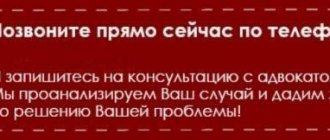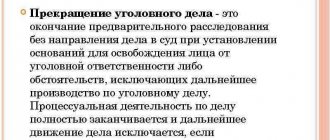The right of the accused to familiarize himself with the materials of the criminal case
Lawyer Antonov A.P.
The Code of Criminal Procedure of the Russian Federation gives the accused the right to familiarize himself, at the end of the preliminary investigation, with all the materials of the criminal case and to extract from the criminal case any information and in any volume. In this case, the form and procedure for familiarization with the necessary materials are chosen by the investigator, prosecutor and court within the limits that exclude the danger of disclosure of investigative secrets.
The accused’s right to familiarize himself with the materials of the criminal case does not arise simultaneously with the beginning of this stage of the preliminary investigation stage. Initially, the investigator (inquirer, etc.) organizes the materials (in chronological or thematic order), evaluates the collected evidence, formalizes the criminal proceedings, and notifies the participants in the criminal process about the completion of the preliminary investigation.
Before the right of the accused to familiarize himself with the materials of the criminal case is exercised, the investigator (investigating officer, etc.) may also present the materials of the preliminary investigation to the victim and (or) his representative, another accused, or defense attorney for review and draw up appropriate protocols. However, familiarization with another (other) accused (relevant defense attorney, legal representative) can be carried out after the specific accused has become familiar with the materials of the criminal case. It does not violate the requirements of the law for the accused to familiarize himself with the materials of the criminal case together with his defense attorney and (or) legal representative.
In clause 12, part 4, art. 47 of the Code of Criminal Procedure of the Russian Federation refers to the “completion of the preliminary investigation”. Preliminary investigation means criminal procedural activity that begins after the investigator (inquirer, etc.), in accordance with the requirements of the Code of Criminal Procedure of the Russian Federation, makes a decision on the existence at his disposal of a reason to initiate a criminal case and sufficient data indicating signs of the objective side of the crime (decision on initiation of a criminal case), and ending with the collection of a sufficient body of evidence about the entire subject of proof as a whole (establishing the factual grounds for termination of the criminal case).
The preliminary investigation, in which the accused is one of the participants, ends with a decision to terminate the criminal case or an indictment (indictment, indictment). In both cases, before making this decision, the investigator (investigating officer, etc.) is obliged to explain to the accused the right to familiarize himself with the materials of the criminal case and provide him with a real opportunity to exercise this power.
When the criminal case ends with the drawing up of an indictment, the investigator, in accordance with Art. Art. 166 and 167 of the Code of Criminal Procedure of the Russian Federation, a protocol is drawn up, which reflects the fact that the accused has been notified that all investigative actions in the criminal case have been carried out, and the collected evidence is sufficient to draw up an indictment, explaining to the accused what is provided for in Art. 217 of the Code of Criminal Procedure of the Russian Federation, the right to familiarize yourself with all materials of the criminal case, both personally and with the help of a defense lawyer or legal representative.
At the end of the inquiry, the investigator familiarizes the accused not only with the materials of the criminal case, but also with the indictment, which is noted in the protocol of familiarization with the materials of the criminal case.
As a general rule, the accused gets acquainted with the materials of the criminal case simultaneously and together with his defense attorney. However, Part 1 of Art. 217 of the Code of Criminal Procedure of the Russian Federation gives him the right to get acquainted with the materials of the criminal case separately from the defense lawyer. To do this, he and his defense attorney are required to submit a corresponding petition to the official conducting the preliminary investigation. Such a request must be granted.
The accused has the right to familiarize himself with all materials of the criminal case. This means that he must be presented not only with evidence, but also with procedural documents drawn up by the investigator (inquiry officer, etc.) before he began to familiarize himself with the materials of the criminal case. He gets acquainted not only with written media of evidentiary information, but also with material evidence, and, at his or his defense attorney’s request, with audio, video, etc. appendices to investigative protocols. If it is impossible to present material evidence to the accused about this fact, a resolution is issued (Part 1 of Article 217 of the Code of Criminal Procedure of the Russian Federation).
The accused is not given the opportunity to get acquainted only with information about the identity of the victim, his representative, witness, their close relatives, relatives and close persons in respect of whom a decision was made to keep this information secret in accordance with Part 9 of Art. 166 Code of Criminal Procedure of the Russian Federation.
After the accused has familiarized himself with the materials of the criminal case, at the end of the investigation, a protocol is drawn up according to the rules of Art. Art. 166, 167, 218 Code of Criminal Procedure of the Russian Federation.
If, after the exercise of the right of the accused in question, any of the other accused (their defenders, legal representatives) become acquainted with the materials of the criminal case, the investigator is not obliged to provide the accused with a record of this procedural action for information. If the specified familiarization took place before a similar action carried out with the participation of the accused, the protocol of familiarization with the materials of the sought criminal case of the other participant is presented to the accused along with all other materials of the criminal case.
From the reasoning given here, it is not difficult to understand that under “criminal case materials” in paragraph 12 of Part 4 of Art. 47 of the Code of Criminal Procedure of the Russian Federation is understood as a set of documents (appendices to them and material evidence) that record the process of verifying a statement (report) of a crime and a preliminary investigation into the circumstances of the event under investigation.
And one more thing. Familiarization with the materials of the criminal case is the right of the accused, not his obligation. In this regard, he can either completely refuse to implement it or familiarize himself with the materials of the criminal case selectively. This circumstance should set up the investigator (inquiry officer, etc.) so that in the case when the accused did not want to familiarize himself with “all” the materials of the criminal case, a document appears in the criminal case from which it follows that he was given the proper real opportunity, but he on his own initiative refused to implement it.
In this regard, it seems to be a negative practice to indicate in the protocol of familiarization of the accused with the materials of the criminal case that the latter became familiar with all the materials of the criminal case, when he decided to read only part of them or did not look at them at all. In the protocol drawn up, the investigator (investigator, etc.) is obliged to fully and correctly reflect the progress and results of the review. The reluctance of the accused to become familiar with certain parts of the criminal case is recorded in the protocol and certified by the signature of the accused.
The fact that the accused, on his own initiative, did not familiarize himself with this or that document (did not examine the material evidence) does not constitute a violation of his rights. But an entry that does not correspond to reality in the protocol of familiarization with the materials of the criminal case makes illegal all the required procedural actions carried out by the investigator (inquiry officer, etc.).
And I would also like to say about one criminal procedural rule. If the accused, who is not in custody, does not appear to familiarize himself with the materials of the criminal case without good reason, then the investigator, after five days from the date of announcement of the completion of investigative actions or from the date of completion of familiarization with the materials of the criminal case by the defense lawyer, the legal representative of the accused and (or ) representative of the victim, civil plaintiff, civil defendant draws up an indictment and sends the materials of the criminal case to the prosecutor.
The accused has the right not only to get acquainted, but also to “write out” any information and in any volume from the materials of the criminal case. According to Vladimir Dahl's dictionary, the verb “write out” means to write off, rewrite in parts, by choice; extract, extract, list, write the essence, briefly. Accordingly, the accused is given the right by the legislator to rewrite both individual parts of the criminal case materials, at his choice, and to copy all the materials of the criminal case; make excerpts and lists from them, as well as make notes that would briefly reflect the essence of the documents with which he became acquainted.
It seems that copying of parts of audio, video, etc. should also be included in the extract. records (files) contained in the case, as well as photographing, scanning, etc. the accused of physical evidence and documents.
That is why he is given the right to write out not only written information, but “any” information contained in the criminal case and in any volume.
Sincerely, lawyer Anatoly Antonov, managing partner of the law firm Antonov and Partners.
Still have questions for your lawyer?
Ask them right now here, or call us by phone in Moscow +7 (499) 288-34-32 or in Samara +7 (846) 212-99-71 (24 hours a day), or come to our office for a consultation (by pre-registration)!
Protocol of acquaintance with the accused | part 1
Protocol of familiarization of the accused and his defense attorney with the materials of the criminal case (sample of completion) PROTOCOL of familiarization of the accused and his defense attorney with the materials of the criminal case in the city of Ensk June 27, 201* Senior investigator of the investigative department of the Sovetsky District Department of Internal Affairs of the city of Ensk, senior lieutenant of justice Golovko M.M. in the cab. No. 105 of the Sovetsky District Department of Internal Affairs of Ensk, on the basis of a petition from the accused Konstantin Nikolaevich Pozharov and his defense attorney Oleg Ivanovich Polosukhin to familiarize themselves with the materials of the criminal case jointly, guided by Art. 217 of the Code of Criminal Procedure of the Russian Federation, presented to the accused Pozharov K.N. and his defender Polosukhin O.I. materials of the criminal case No. 123489. Accused Pozharov K.N. and his defender Polosukhin O.I. were familiarized with the materials of the criminal case, contained in volume 1 on 53 sheets, filed and numbered, with material evidence - a switchblade, and other materials - an audio recording of the interrogation of witness P.N. Vasilkov, through personal familiarization with the appearance of the knife. At the request of the accused Pozharov K.N. An audio recording of the interrogation of witness P.N. Vasilkov was played. Familiarization with the materials of the criminal case began on June 27, 201* at 10 a.m. 00 min, ended June 27, 201* at 15 o'clock. 40 min. After reading the materials of the criminal case from the accused Pozharov K.N. and (or) from his defender Polosukhin O.I. no petitions and (or) other statements were received. Accused: K.N. Pozharov Defender: O.I. Polosukhin After reviewing the materials of the criminal case, the rights provided for in Part 5 of Art. 217 of the Code of Criminal Procedure of the Russian Federation: 1) apply for consideration of my criminal case by a court with the participation of a jury - in cases provided for in paragraph 1 of part 3 of Art. 31 Code of Criminal Procedure of the Russian Federation; 2) apply for the application of a special procedure for judicial proceedings - in cases provided for in Art. 314 Code of Criminal Procedure of the Russian Federation; 3) apply for preliminary hearings - in cases provided for in Art. 229 of the Code of Criminal Procedure of the Russian Federation. The rights provided for in clauses 1 - 3, part 5, art. 217 of the Code of Criminal Procedure of the Russian Federation, I don’t want to use it. Accused: K.N. Pozharov Defender: O.I. Polosukhin The protocol was read by the accused and his defense attorney in person. There are no comments to the protocol. Accused: K.N. Pozharov Defender: O.I. Polosukhin This protocol was drawn up in accordance with Art. 166 and 218 of the Code of Criminal Procedure of the Russian Federation. Senior investigator of the investigative department of the Sovetsky District Department of Internal Affairs of Ensk, senior lieutenant of justice M.M. Golovko








